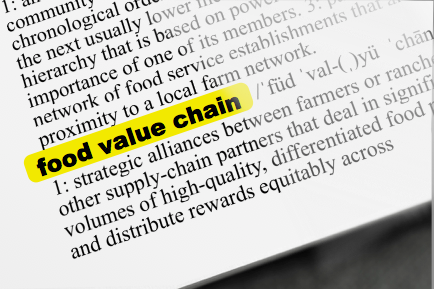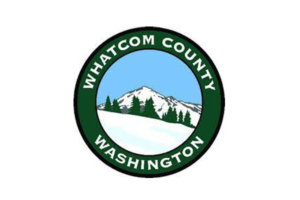Why a Value Chain is the new Supply Chain
While presenting to a client in Texas on supply chains, we realized that we were using the words supply chain and value chain interchangeably — is that correct?
The answer is no. But, like all “food system terms” in the Good Food Glossary, it’s complicated.
A traditional food supply chain is a set of trading partner relationships and transactions that delivers food products from producers to consumers. Or, how you came to be eating ice cream on a hot summer day. The more complicated the food product, the more stakeholders involved. For ice cream, it’s how the eggs, milk, and sugar harvested by farmers from chickens, cows, and sugar cane fields went through a processing center to the freezer at a local grocery store.
Supply chains are driven by the end product. How the supply chain is structured – that is, the number of relationships in the supply chain – influences the information people receive about the origin of their food, the amount of fuel used in transportation, and, ultimately, the prices that farmers receive for their product and the price consumers pay for the finished good.
Restructuring a supply chain may improve the price on either end; however, sustainable food system advocates discovered that by creating shared value between the stakeholders among the entire supply chain, not only were greater profits generated for everyone involved, it also contributed to a stronger local, sustainable supply chain ecosystem.
Traditional supply chain economics do not take into account unprofitable externalities like quality of life, soil health, trusting relationships, and community empowerment. However, these assets impact the livelihood of businesses, farms, and communities.
Food value chains, as defined by the USDA, are “strategic alliances between farmers or ranchers and other supply-chain partners that deal in significant volumes of high-quality, differentiated food products and distribute rewards equitably across the chain.” The concept of a food value chain emerged in response to the growing awareness among both producers and consumers that growing food cannot solely be a transactional relationship based on money exchanging hands. Consumers are demanding more transparency as their values evolve, such as if they choose to buy “locally sourced” or “organic” ice cream.
Relationship building is key to success in the farming industry. Today, this means building direct relationships with consumers who share your values whether they be individuals shopping at a farmers market or a food service director at a large school district. As a result, consumers understand what it takes to grow a product, distributors trust the farmers that they source from, and farmers gain a premium price for their goods which impacts all players along the supply chain. By championing sustainable shared values, the food value chain represents a stronger, more collaborative approach to doing business.
Food hubs, previously mentioned in the Good Food Glossary, are important players in food value chains. Many farmers and ranchers, especially smaller and mid-sized operations, lack the capacity to access commercial markets on their own. Food hubs help them band together and gain entry into larger-volume markets adding their value to food-industry market trends.





Where did the original of the image of the supply chain come from? I can’t find a Chicago Council publication with that image? Thanks!
Jim, it looks like the original photo has been removed from the Chicago Council website! We couldn’t find it either when we searched recently. Apologies.